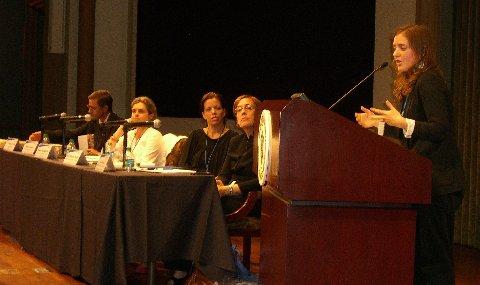Breaking Barriers to Achieve Security, Justice, and Peace
Published on October, 41 2012
by Anne Hoiberg, UN SCR 1325 Subcommittee
From September 26-28, 146 women peacemakers and peacebuilders gathered at the Joan B. Kroc Institute for Peace & Justice in San Diego for its fifth international conference, “Breaking Barriers--What it will take to achieve security, justice, and peace.” To be confronted in conference deliberations are the barriers impeding women’s progress: militarism, patriarchy, corruption, gender-based violence, impunity, and misogyny. This enews report summarizes conference presentations and recommendations subsumed under the categories of challenges related to security, justice, and peacebuilding.
Challenges to Security, Justice, and Peace
Although gender-based instruments related to security have been adopted by U.N. member states, this acceptance does not guarantee implementation or security. Reports connecting gender-based violence to arms trade and disarmament agreements have been ignored as has the shifting of militarism funds to meeting human needs. Challenges to justice center on women’s limited access to courts as well as to transitional and transformative justice. Peace can only be achieved if the barriers of patriarchy and militarism are broken.
Recommendations to the U.N., national government agencies, civil society organizations Security: appoint more Gender Advisors; involve more men in gender work; increase women’s political participation; protect populations from mass atrocities; integrate women’s perspectives into prevention and protection mechanisms; arrange for disarmament and trade specialists to work with UN Women and CEDAW committee members to incorporate gender issues in agreements; allocate funds from militarism to meet human needs; and foster women’s access to technology, education, media, and networking
Justice: educate women about their rights and law systems, help them gain access to justice, compensation, and reparation; encourage women to seek justice in all courts, protected from harm and stigma; increase women’s participation in courts as judges or legal experts; transfer government funds from militarism to law enforcement and the judiciary; provide government funds for women’s leadership training; end corruption; and adopt the 4P and 3R paradigms to end human trafficking and protect victims
Peacebuilding: approach foundations to fund research on women peacebuilding; develop means to end patriarchy, prevent the privatization of the military; end the arms trade and all elements of militarization (e.g., abolish nuclear weapons); encourage mothers to stop their children from becoming soldiers; create a cohesive message about the society that we want; and support peace women—they never give up
WILPF’s Secretary-General, Madeleine Rees, reminded the conferees that women through their NGOs should raise their voice to power to inform their governments of women’s human rights laws and resolutions, instruments to be used to achieve what women want: security, justice, and peace. “We can do it.”
Image: Rebecca Gerome, speaking. Seated: Sarah Taylor, Petra Totterman Andorff, Nadine Puechguirbal, and Lt. Col. Jesus Ignacio Gil Ruiz



